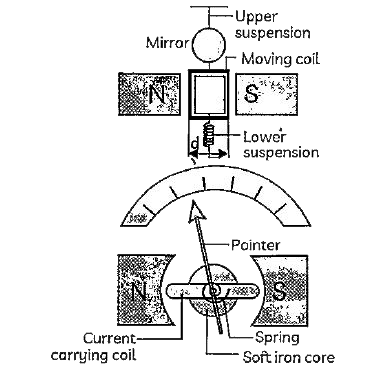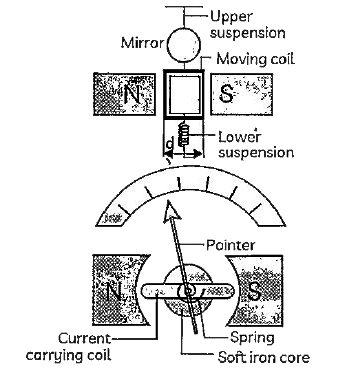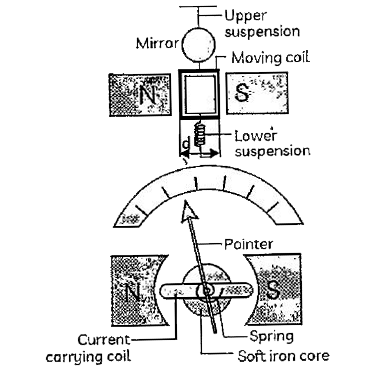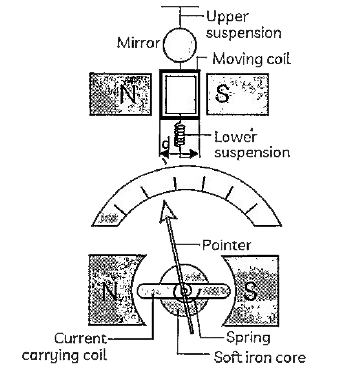Is the resistance of a voltmeter greater than or less that of the galvanometer of which it is formed?
It is always greater than the resistance of the galvanometer.
Topper's Solved these Questions
- ELECTROMAGNETICSBOOK - AAKASH SERIESCHAPTER - ELECTROMAGNETICSEXERCISE - PROBLEMS (LEVEL -I)
30 Videos
- ELECTROMAGNETICSBOOK - AAKASH SERIESCHAPTER - ELECTROMAGNETICSEXERCISE - PROBLEMS (LEVEL -II)
35 Videos
- ELECTROMAGNETICSBOOK - AAKASH SERIESCHAPTER - ELECTROMAGNETICSEXERCISE - ADDITIONAL EXERCISE
6 Videos
- ELECTROMAGNETIC WAVESBOOK - AAKASH SERIESCHAPTER - ELECTROMAGNETIC WAVESEXERCISE - EXERCISE -II
20 Videos
- ELECTROSTATICSBOOK - AAKASH SERIESCHAPTER - ELECTROSTATICSEXERCISE - ADDITIONAL PRACTICE EXERCISE (PRACTICE SHEET (ADVANCED) INTEGER TYPE QUESTIONS)
4 Videos
Similar Questions
(A) : The resistance of voltmeter is very small as compared to the resistance of the galvanometer, from which it is obtained.
(R) : The voltmeter is connected in series to the conductor across which potential difference is to be measured.
View Solution100mA current gives a full scale deflection in a galvanometer of 2Ω resistance. The resistance connected with the galvanometer to convert it into a voltmeter to measure 5V is
View Solution
Knowledge Check
If resistance of voltmeter is 10000Ω and resistance of ammeter is 2Ω then find R when voltmeter reads 12 V and ammeter reads 0.1 A
A118 ΩB120 ΩC124 ΩD114 ΩCase Study: Read the following paragraph and answer the questions.
Since a voltmeter in a series combination of a galvanometer and a high resistance R. so its resistance is much higher than the galvanometer. Higher the range of voltmeter to be prepared from given galvanometer, higher will be the value of series high resistance required for the purpose. The range of voltmeter can be both increased or decreased.

To convert a galvanometer into a voltmeter will have to addAhigh resistance in parallelBhigh resistance in seriesClow resistance in parallelDlow resistance in seriesCase Study: Read the following paragraph and answer the questions.
Since a voltmeter in a series combination of a galvanometer and a high resistance R. so its resistance is much higher than the galvanometer. Higher the range of voltmeter to be prepared from given galvanometer, higher will be the value of series high resistance required for the purpose. The range of voltmeter can be both increased or decreased.

A galvanometer acting as a voltmeter will haveAhigh resistance in parallel with its coilBlow resistance in parallel with its coilChigh resistance in series with its coilDlow resistance in series with its coil
Case Study: Read the following paragraph and answer the questions.
Since a voltmeter in a series combination of a galvanometer and a high resistance R. so its resistance is much higher than the galvanometer. Higher the range of voltmeter to be prepared from given galvanometer, higher will be the value of series high resistance required for the purpose. The range of voltmeter can be both increased or decreased.

A galvanometer with 8Ω resistance is shunted by wire of 2Ω current is 1A. The part of current passing will be
View SolutionCase Study: Read the following paragraph and answer the questions.
Since a voltmeter in a series combination of a galvanometer and a high resistance R. so its resistance is much higher than the galvanometer. Higher the range of voltmeter to be prepared from given galvanometer, higher will be the value of series high resistance required for the purpose. The range of voltmeter can be both increased or decreased.

To convert galvanometer into answer connect
View SolutionAssertion : Potential measured by a voltmeter across a wire a always less than actual potential difference across it.
Reason : Finite resistance of voltmeter changes current flowing through the resistance across which potential difference is to be measured.
View SolutionThe function of high resistance connected in series with the galvanometer in voltmeter is
View Solution100 current gives a full scale deflection in a galvanometer of 2Ω resistance. The resistance connected with the galvanometer to convert it into a voltmeter to measure V 5 is
View Solution
